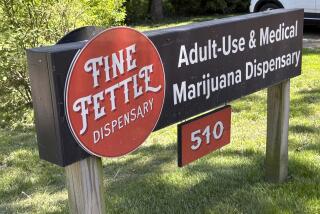U.S. Eases Rule on Drug-Linked Ship Seizures
- Share via
WASHINGTON — Coast Guard and Customs Service officials said Friday that they planned to relax their controversial “zero tolerance” policy, under which federal agents have seized yachts, fishing boats and research ships after finding tiny amounts of marijuana on board.
Under growing pressure from Congress and irate boat owners, the officials said they intended to modify the program to avoid penalizing innocent boat owners whose guests or crewmen were found with small quantities of illegal drugs.
“We are trying to exercise better judgment,” said Customs Service Commissioner William von Raab, the initiator of the “zero tolerance” policy. “We need to focus more on culpability.”
In announcing the new policy, Customs officials said Friday that they would return the $80-million research vessel Atlantis II to its owner, the Woods Hole Oceanographic Institution, because the institution had been unaware of marijuana on board.
Customs agents had seized the vessel, the premier ship in the U.S. oceanographic research fleet, after a drug-sniffing dog found less than one-hundredth of an ounce of marijuana in a crewman’s shaving kit Wednesday. Woods Hole will continue operating the ship while it petitions for its formal release from the Customs Service.
Von Raab and Coast Guard officials were adamant Friday that they planned to continue, under their authority to police the nation’s coastlines, to board ships and look for drugs. Von Raab said in an interview that federal agents would continue to seize ships when even the smallest amounts of drugs were found, so long as the operators were aware of the drugs.
Not Black and White
“What we have found doing the boardings is that this isn’t just a black or white thing,” Jim Simpson, a Coast Guard spokesman in Miami, said. “We are working on some more reasonable procedures for implementing this policy. After all, how can you take away a charter fishing boat from the owner just because some fisherman had a joint?”
Lawyers for the two agencies spent most of Friday trying to draw up a revised set of procedures to govern when ships could be seized and when they must be forfeited.
“We want to spell out the procedures so people will know the rules,” said Werner Siems, a spokesman at Coast Guard headquarters. “We expect to get something out pretty soon.”
Privately, officials of each agency blamed the other for a policy that has become a public relations disaster.
One Customs official said the Coast Guard had made the entire policy “look stupid by mindlessly implementing it.” He said the policy never called for seizing a ship from a blameless owner.
Monkey Business Cited
He cited as an example the Coast Guard’s seizure in Florida last week of the party boat Monkey Business, made famous by the excursion to Bimini by former Sen. Gary Hart (D-Colo.) and Donna Rice. The Coast Guard turned the ship over to Customs officials, who quickly released it because the owner was not to blame for the drugs’ being on board.
Meanwhile, Coast Guard officials complained that the Customs Service had announced its tough “zero tolerance” policy in March without thinking through how to implement it.
“It doesn’t seem that this was well thought out on either side,” said Larry Innis, an aide to the House Merchant Marine and Fisheries subcommittee on the Coast Guard.
Subcommittee Chairman Earl Hutto (D-Fla.) scheduled a hearing for Thursday with Coast Guard and Customs officials. “The theory behind this might be OK,” he said, “but they need to implement it with more reasonableness.”
President Reagan’s last word on the policy was issued Wednesday in a speech to Coast Guard Academy graduates. “When we say no to drugs, it will be clear that we mean absolutely none--no exceptions,” Reagan declared.
As for the Atlantis II, the Customs Service gave the Woods Hole Oceanographic Institute 30 days to file a formal petition for return of the ship, according to Michael Fleming, a Customs spokesman in Los Angeles.
To Cite Anti-Drug Policy
The petition will include a statement setting out the institution’s anti-drug practices and a policy stating that an employee’s use of drugs is cause for dismissal, said Rob Brown, a spokesman for Woods Hole.
Brown said Woods Hole officials had not decided whether to fire Richard F. Morris, the 27-year-old engineer from Buzzards Bay, Mass., in whose stateroom the marijuana was found. The ship had just returned to the United States after an extended trip and was undergoing a routine Customs inspection.
Morris pleaded guilty in federal court Thursday to a misdemeanor charge of possession of marijuana, but the charge will be dropped at the end of one year if his record remains clean, according to Steven Meinrath, Morris’ lawyer.
Discovered Titanic
The Atlantis II carries the Alvin, a deep-diving submersible that has made numerous oceanographic discoveries. In July, 1986, Robert Ballard of Woods Hole used Alvin to find the submerged wreckage of the Titanic and a remote-controlled “electronic eyeball” called Jason Jr. to photograph it.
More to Read
Sign up for Essential California
The most important California stories and recommendations in your inbox every morning.
You may occasionally receive promotional content from the Los Angeles Times.














